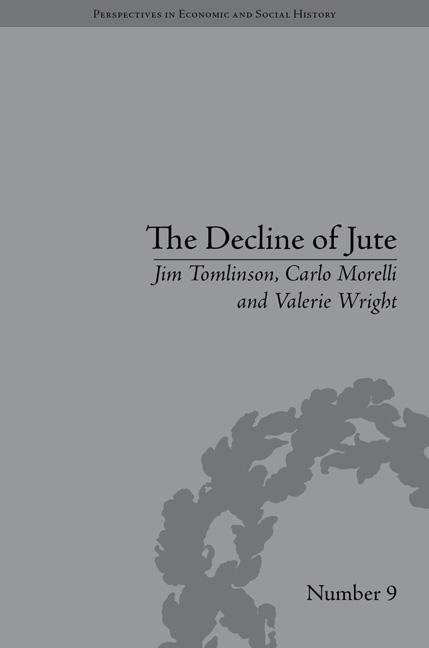Book contents
- Frontmatter
- CONTENTS
- Dedication
- Acknowledgements
- Abbreviations
- List of Figures and Tables
- Introduction
- 1 The Story up to 1939
- 2 De-Globalization and Decline, 1939–99
- 3 The Industry and its Workforce
- 4 Defending the Domestic Industry
- 5 Firms’ Responses to the Decline of the Industry
- 6 Influencing Government
- 7 The Decline of Jute and the Economic Health of Dundee
- Conclusions
- Notes
- Works Cited
- Index
6 - Influencing Government
- Frontmatter
- CONTENTS
- Dedication
- Acknowledgements
- Abbreviations
- List of Figures and Tables
- Introduction
- 1 The Story up to 1939
- 2 De-Globalization and Decline, 1939–99
- 3 The Industry and its Workforce
- 4 Defending the Domestic Industry
- 5 Firms’ Responses to the Decline of the Industry
- 6 Influencing Government
- 7 The Decline of Jute and the Economic Health of Dundee
- Conclusions
- Notes
- Works Cited
- Index
Summary
The Second World War brought a major watershed for the jute industry and for Dundee. For Britain generally the war created a new economic and social settlement, characterized above all by a state commitment to a much more active role in securing economic welfare, and especially ‘high and stable’ employment. More narrowly, the imposition of Jute Control in 1939 gave protection to the Dundee industry for the first time. As a result of these two factors, in the decades following the war, jute's position would be negotiated with the government in a context in which protectionism was an established fact, and the removal of that protection fundamentally constrained by the political impact of any consequential unemployment in Dundee.
A New World
The new social settlement derived from the character of ‘total war’, and its impact in generating both full employment and a shift in the balance of political forces which underpinned commitments to a much greater role for government in securing popular economic and social well being. Integral to this settlement was expanded welfare provision, especially major social security expansion based on the Beveridge social insurance model, coupled with the foundation of the NHS, and the provision of free secondary education to all. Alongside that provision was a recognition that full employment was central to popular welfare, leading to the 1944 Employment Policy White Paper and policies designed to fulfil its promises.
- Type
- Chapter
- Information
- The Decline of JuteManaging Industrial Change, pp. 119 - 134Publisher: Pickering & ChattoFirst published in: 2014



